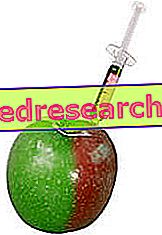From the chemical and functional point of view, there is no difference between natural and synthetically obtained vitamin C. In other words, whatever the source or method of synthesis or extraction used, the L-ascorbic acid keeps its biological activity and its bioavailability unchanged regardless of its origin.

The differences, therefore, are not to be found on the vitamin C itself, but on the substances associated with it; if, for example, we consider a particularly generous source of vitamin C such as the acerola ( Malpighia glabra L. frutti), we cannot forget the very important role of the phytocomplex: a more or less broad set of molecules that determines the overall biological activity of a drug, modulating the action of the characterizing active ingredients. In other words, taking 100 mg of synthetic vitamin C and taking the same amount through an acerola extract standardized in L-ascorbic acid is not the same thing, not because vitamin C itself has a different biological activity, but because the substances associated with it are different. While in the first case we have a pure and isolated vitamin C, in the extract of acerola we also find substances that modulate biological activity and bioavailability; the acerola fruits, in particular, contain other molecules with antioxidant activity, such as flavonoids and vitamins (carotenoids, B1, B2, PP); the high concentration of tannins, thanks to the astringent action, counteracts the potentially laxative action of high-dose vitamin C and sugars (fructose, dextrose). The example, obviously, can also be extended to common foods; on the other hand the differences between eating an orange or a kiwi and taking a tablet that provides the same amounts of vitamin C are evident even to inexperienced eyes. All this proves that food supplements cannot and will never - however complete and effective - replace healthy and balanced nutrition. If a specific integration of ascorbic acid is necessary, the choice between natural vitamin C and synthetic vitamin C depends on the functional meaning of the integration: if for example one simply wants to enrich one's diet with ascorbic acid for the most varied reasons, it is convenient focus on the most economical synthetic vitamin C, while if the intent is to increase the intake of antioxidants it is good to focus on plant extracts rich in vitamin C or on more complex supplements, containing - for example - also lipoic acid, resveratol, tocopherols and tocotrienols.
Among the most generous sources of natural vitamin C - in addition to the classic foods (citrus fruits, kiwis, peppers and chillies, berries, broccoli, fresh fruit and vegetables in general) - we recall:
Acerola ( Malpighia glabra L.) fruits, 1000-4500 mg of vitamin C for 100g
Rosa canina ( Rosa canina L.) fruits,, 300-1700 mg of vitamin C for 100g
Baobab ( Adansonia digitata L.) fruits, 150 - 499 mg of vitamin C for 100 g
Camu Camu ( Myrciaria dubia (Kunth) McVaugh) fruits, 2000-3000 mg of vitamin C for 100g
Kakadu Plum ( Terminalia ferdinandiana Exell) fruits, 3200-5000 mg of vitamin C for 100g
Regarding safety and side effects, many people are - naively - convinced that natural vitamin C is safer than synthetic only because it has been given the adjective "natural". In reality, we must not forget that to extract vitamin C from a vegetable source, however, we must use chemical substances, which can remain in the finished product in small quantities. If the whole pulverized and dried vegetable source is used (or the dried fruit juice), in the phytocomplex together with natural vitamin C it could also be found undesirable substances for some particular categories of patients, especially for those that manifest multiple allergies.
Vitamin C online

Online a vitamin C 1000 mg supplement is available in a pack of 180 tablets for a supply of six months. With just one tablet (easily eaten) a day you can get all the vitality of 1, 000 mg of Vitamin C.
Free of milk, lactose, soy, gluten, wheat, yeast and vegetables, this supplement is entirely produced in the United Kingdom, and is therefore able to guarantee compliance with the highest quality standards. The pack of 180 tablets has an advantageous price and ensures a supply of high quality Vitamin C for six months.
Available online
Alternatively, you can buy a vitamin C supplement with Rosa Canina Extract and bioflavonoids in the 270 tablet format, for a nine-month supply.
Free of gluten and lactose, this product is composed of Vitamin C enriched with bioflavonoids and dog rose to increase absorption and benefits. Each tablet, taken once a day during one of the main meals, contains 1000 mg of vitamin C, 20 mg of Rosa Canina extract (equivalent to 400 mg of rosacanine) and 20 mg of Bioflavonoids. Manufactured with top quality materials and in compliance with European standards, this supplement is 100% vegan and gelatine free, artificial additives, dyes and preservatives.
Sponsored content: My-personaltrainer.it presents products and services that can be purchased online on Amazon and / or on other e-commerce sites. Whenever a purchase is made through one of the links on the page, My-personaltrainer.it could receive a commission from Amazon or other cited e-commerce. We inform you that the prices and availability of the products are not updated in real time and may change over time, so we invite you to check availability and price on Amazon and / or on other cited e-commerce.



